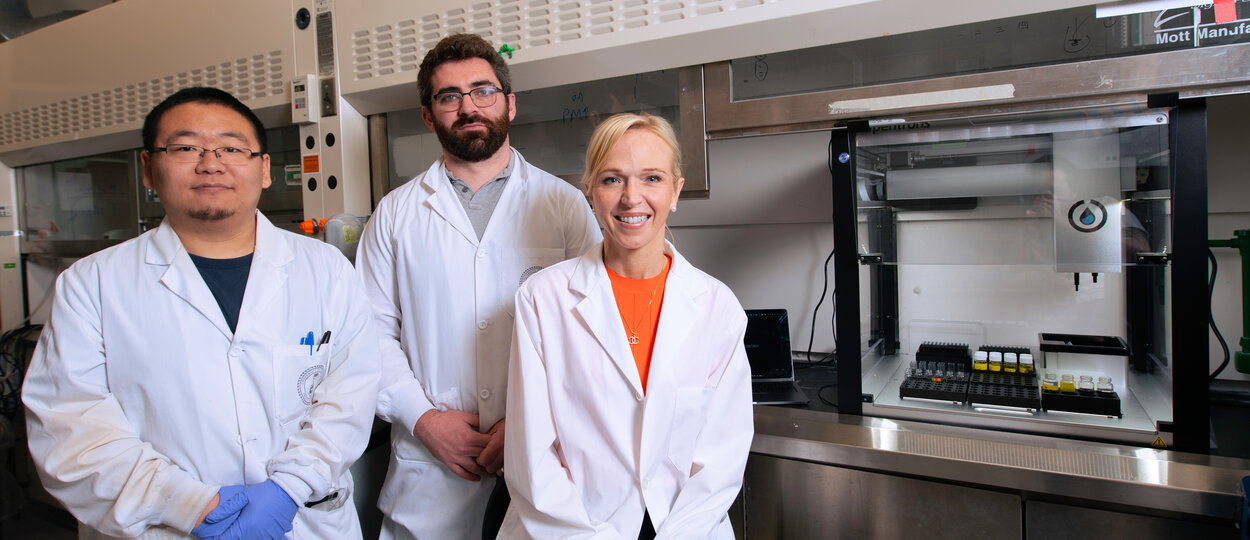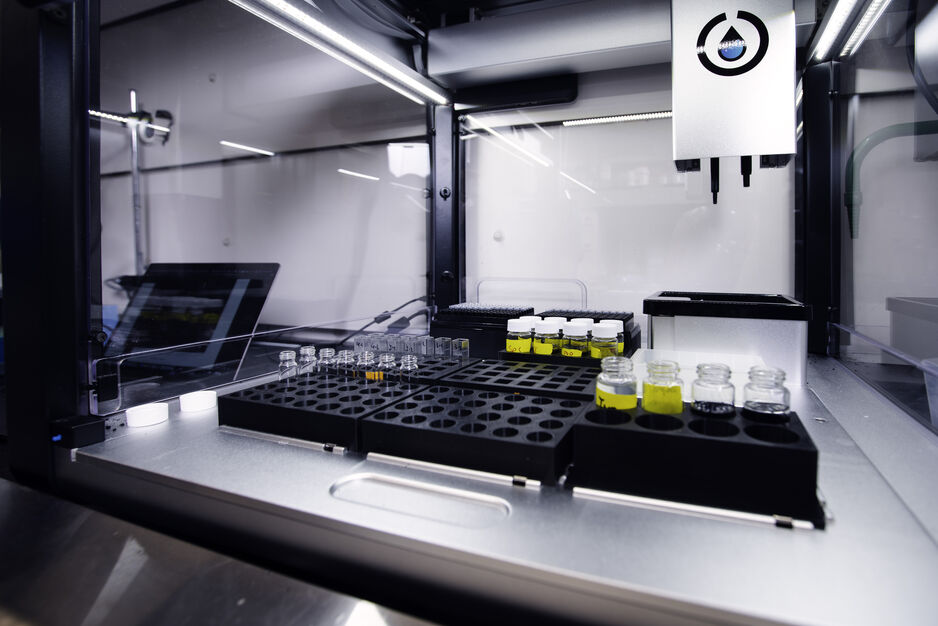From left: Phd trainee Zeqing Bao, Allen Lab Director of Research and Partnerships Pauric Bannigan, and Professor Christine Allen
Self-driving lab at Leslie Dan Faculty of Pharmacy is one of six at U of T being funded through $200-million grant to Acceleration Consortium
A new autonomous lab that uses machine learning is being built in the Leslie Dan Faculty of Pharmacy and will help to design and optimize formulations that will improve bioavailability, stability and efficacy of a variety of drugs. Christine Allen, professor at the Leslie Dan Faculty of Pharmacy, is co-leading the lab with engineering professor Frank Gu.
“The world is finally understanding the impact of formulation technology and how powerful it is. Now we can marry that technology with AI and machine learning, so we’re kind of unstoppable.”
“I see huge potential for artificial intelligence (AI), machine learning and automation in pharmaceutical sciences, for formulations and beyond,” says Allen, an expert in drug formulations. “The world is finally understanding the impact of formulation technology and how powerful it is. Now we can marry that technology with AI and machine learning, so we’re kind of unstoppable.”
The new lab, known as a self-driving lab, uses AI, automation, and advanced computing to test different combinations of materials and iteratively develop the best formulations. This emerging technology will allow researchers to evaluate a much larger number of materials, significantly cutting both the money and time required to identify a new drug formulation.
Allen explains that formulation scientists are often working under tight time constraints to get a product to market by deadline, and the final formulations are the best that can be done with the time available but are not necessarily the best possible option.
“We’re providing a solution to that – accelerating formulation development while looking for the best formulation,” says Allen, whose team worked in collaboration with professor Alán Aspuru-Guzik’s research group to develop a prototype of the self-driving lab last year. “Being able to evaluate a large number of formulations and volumes of data in a short period of time allows us to do that. We can use the time we have available and still deliver the best formulation in that short time.”
The self-driving lab at the Leslie Dan Faculty of Pharmacy, based on Allen’s team’s prototype, is one of six being built at U of T through a $200-million grant from the federal government to the Acceleration Consortium, a global network of government, industry and academic researchers accelerating the discovery of materials and molecules needed for a sustainable future. Allen played a key role in spearheading the Acceleration Consortium during her time as Associate Vice-President and Vice Provost, Strategic Initiatives, as a strategic initiative of the university.
As a co-lead on the project, Gu is bringing his expertise in nanotechnology engineering to develop high-quality, precise formulations that use nanotechnology to improve the delivery, bioavailability, and efficacy of drugs.
“Nanotechnology engineering has revolutionized the pharmaceutical industry, and its potential applications in a self-driving lab are both imminent and paradigm-shifting,” says Gu. “By harnessing the power of nanotechnology in a self-driving lab for pharmaceutical formulations, my lab is working with Professor Allen’s team to unlock many advantages that will transform drug development, formulation, modular manufacturing, and patient care.”
Trainees will gain key skills that prepare them for leadership roles in industry
Allen says that the self-driving’s lab strong collaboration between pharmaceutical scientists and computer scientists also provides unique educational opportunities for trainees that will provide them with key skills needed for a career in the pharmaceutical industry.
“The trainees are experts in both fields. This is where the future is going, and that to me is the power in all of this. It is true interdisciplinary collaboration,” says Allen. “The trainees are gaining knowledge, expertise and experience, and they are then able to secure really exciting positions in industry and be leaders in the field.”
Last year, Allen took a leave of absence from the university to take on a leadership role with adMare Bioinnovations, an organization that helps support Canadian life science companies and researchers. She has now returned to the Leslie Dan Faculty of Pharmacy full-time and brings back a wealth of new experience in entrepreneurship that she plans to apply to her research and the work of the Acceleration Consortium.
In fact, Allen is also chairing the Commercialization and Partnerships Committee for the Acceleration Consortium, which aims to develop partnerships with industry and develop commercialization and company creation opportunities, and she is also developing a graduate course in innovation and entrepreneurship.
With a focus on translational research and commercialization, both Allen and Gu are excited about the potential of the lab to generate new formulations that will ultimately improve patient outcomes.
“The self-driving lab is the most cutting-edge technology to help the pharmaceutical industry to drive toward digitization, automation and ultimately improve efficiency in product development and production,” says Gu. “With its unique capability in bridging automation and iterative discovery process, it is also the key to helping us accelerate the development and production of personalized medicines, which is prohibitively expensive and labour intensive to be done today.”
Acceleration Consortium Annual Conference
For those interested in learning more about how AI and automation are transforming scientific discovery, the Acceleration Consortium is hosting its second annual conference next month, August 22–25, 2023.
Visit accelerate23.ca to learn more or register now!
More News
Image

Pharmacists play key role in HIV prevention care
Canadian HIV experts, including pharmacist Jaris Swidrovich, release new guidelines for HIV prevention medication on World AIDS Day.
Read More
Image

Congratulations to the 2025 Alumni Awards recipients!
Through the Alumni Awards, we recognize graduates whose commitment and contributions continue to shape our Faculty community. Congratulations to our 2025 recipients!
Read More
Image

New toolkit guides clinicians through conversations about polypharmacy
Developed by and for primary care providers, “5 Tips for Managing Polypharmacy” toolkit provides evidence-based recommendations for managing multiple medications.
Read More

